|
Books Should Be Free Loyal Books Free Public Domain Audiobooks & eBook Downloads |
|
|
Books Should Be Free Loyal Books Free Public Domain Audiobooks & eBook Downloads |
|
Travel Books |
|---|
|
Book type:
Sort by:
View by:
|
By: Luis Vaz de Camões (1524-1580) | |
|---|---|
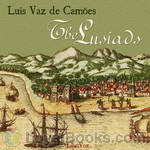 The Lusiads
The Lusiads
The Lusiads (Os Lusíadas) is a Portuguese epic poem, written in the 16th century by Luis Vaz de Camões. The poem tells the tale of the Portuguese discoveries in the 15th and 16th centuries, specially the voyage to India by Vasco da Gama. Modelled after the classic epic tradition, Camões' Lusiads are considered not only the first literary text in Modern Portuguese, but also a national epic of the same level as Vergil's Aeneid. In the 19th century, Sir Richard Francis Burton translated Camões' Lusiads, in what he considered "the most pleasing literary labour of his life". | |
By: Erskine Childers (1870-1922) | |
|---|---|
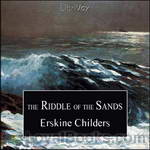 The Riddle of the Sands
The Riddle of the Sands
Containing many realistic details based on Childers’ own sailing trips along the German North Sea coast, the book is the retelling of a yachting expedition in the early 20th century combined with an adventurous spy story. It was one of the early invasion novels which predicted war with Germany and called for British preparedness. The plot involves the uncovering of secret German preparations for an invasion of the United Kingdom. It is often called the first modern spy novel, although others are as well, it was certainly very influential in the genre and for its time... | |
By: R. Talbot Kelly (1861-1934) | |
|---|---|
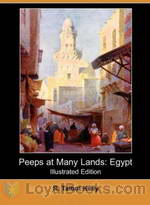 Peeps at Many Lands: Egypt
Peeps at Many Lands: Egypt
A short travelogue of Egypt, this book was written as part of an early 20th century series of travelogues on exotic destinations. | |
By: Grant Allen (1848-1899) | |
|---|---|
 The British Barbarians
The British Barbarians
After Civil Servant Philip Christy crosses paths with the mysterious Bertram Ingledew in the respectable suburb of Brackenhurst, Philip and his sister Frida, married to the wealthy Scot Robert Monteith, become friends with the stranger. Bertram has some unconventional concepts about society, and as the story unfolds, his beliefs and actions cause much disruption in the family and the neighbourhood.Who is Bertram? Where does he come from? Allen explores some interesting ideas about society, some of which are curiously relevant today... | |
By: William H. Hudson (1841-1922) | |
|---|---|
 Far Away and Long Ago
Far Away and Long Ago
William Henry Hudson (August 1841 – 1922) was an author, naturalist and ornithologist. Hudson was born of U.S. parents living in the Quilmes Partido in Buenos Aires Province, Argentina, where he spent his youth studying the local flora and fauna and observing both natural and human dramas on what was then a lawless frontier. ‘Far Away and Long Ago’ is a classic memoir of a boy, fascinated by nature, on the Pampas in the 19th century. | |
By: Winston Churchill (1871-1947) | |
|---|---|
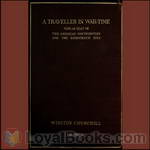 A Traveller in War-Time
A Traveller in War-Time
This is a collection of a series of journalistic articles written during his travels throughout WWI era Europe that Churchill — the American author, not the famed British statesman — published in 1917; the book version came out in 1918. The writing is sharp, straightforward, and rarely sentimental, with loads of local color and occasional humor. | |
By: Samuel Johnson (1709-1784) | |
|---|---|
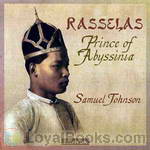 Rasselas, Prince of Abyssinia
Rasselas, Prince of Abyssinia
In this enchanting fable (subtitled The Choice of Life), Rasselas and his retinue burrow their way out of the totalitarian paradise of the Happy Valley in search of that triad of eighteenth-century aspiration – life, liberty and happiness.According to that quirky authority, James Boswell, Johnson penned his only work of prose fiction in a handful of days to cover the cost of his mother’s funeral. The stylistic elegance of the book and its wide-ranging philosophical concerns give no hint of haste or superficiality... | |
By: H. Rider Haggard (1856-1925) | |
|---|---|
 The Brethren
The Brethren
Set in the days of the Crusaders, this books tells of a young maiden named Rosamund, and her twin cousins. Godwin is the grey eyed thoughtful man, and Wulf is the blue eyed warrior. They are both knights of England and they are both in love with their fair cousin. But the riddle of the story is which does Rosamund love?The adventure begins when Rosamund is taken from England and carried to the East. The plot thickens as the two young knights follow her in hopes of rescuing her from the Muslim leader, Saladin... | |
By: J. O. Choules | |
|---|---|
 Young Americans Abroad – Vacation in Europe
Young Americans Abroad – Vacation in Europe
It’s 1851 and the Crystal Palace Exhibition is on in England. English American the Reverend Dr. Choules leaves Newport, Rhode Island with three teenaged students – James Robinson, George Vanderbuilt, and Weld French, who are forced to leave the fourth member of their blue-blooded quartet at home – and all four travelers promise to write to “Dear Charley”, Charles Duston, of later fame. The boys meet the Duke of Wellington, travel down the Rhine, and meet many friends along the way. While the letters are filled with some prejudice against the Catholic religion, they are a product of their time – a sometimes ignorant, but often dazzling, period of our history. | |
By: Frances Calderón de la Barca (1804-1882) | |
|---|---|
 Life in Mexico
Life in Mexico
FRANCES CALDERON DE LA BARCA, born in Edinburgh, 1804, the daughter of William Inglis. After her father’s death she settled in America, where she married the Spanish diplomat, Don Angel Calderon de la Barca. She accompanied him on his various appointments to Mexico, Washington, and finally to Madrid, where she was created Marquesa de Calderon de la Barca by Alfonso XII and died in 1882. The present work is the result of observations made during a two years’ residence in Mexico, by a lady, whose position there made her intimately acquainted with its society, and opened to her the best sources of information in regard to whatever could interest an enlightened foreigner... | |
By: Isabella L. Bird (1831-1904) | |
|---|---|
 A Lady's Life in the Rocky Mountains
A Lady's Life in the Rocky Mountains
Isabella Bird began travelling while in her early twenties to help alleviate illness that had plagued her since childhood. She was a single woman in her early forties when she made her treck through the Rocky Mountains. A Lady’s Life in the Rocky Mountains details this fascinating account of her travels through a series of letters written to her sister, Henrietta. These letters are filled with beautiful, vivid descriptions of the scenery, the people she encountered, the way of life, and a mountain man named Jim Nugent, that was as rough as they come, but a complete gentleman with Ms... | |
By: Sir Henry Morton Stanley (1841-1904) | |
|---|---|
 How I Found Livingstone
How I Found Livingstone
Sir Henry Morton Stanley is famously quoted for saying “Dr Livingstone, i Presume?”. Born in Wales, he migrated over to the United States at the age of 18, and eventually became an overseas correspondent for the New York Herald. In 1869 Stanley was told by James Gordon Bennett Jr to find Livingstone, a scottish missionary and explorer, who was lost in central Africa. When Stanley commented on the cost Bennett’s reply was: “Well, I will tell you what you will do. Draw a thousand pounds now; and when you have gone through that, draw another thousand, and when that is spent, draw another thousand, and when you have finished that, draw another thousand, and so on; but, FIND LIVINGSTONE. | |
By: Oliver Optic | |
|---|---|
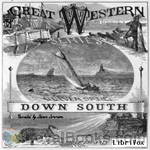 Down South or Yacht Adventure in Florida
Down South or Yacht Adventure in Florida
"Down South" is the fifth and last volume but one of the "Great Western Series." The action of the story is confined entirely to Florida; and this fact may seem to belie the title of the Series. But the young yachtsman still maintains his hold upon the scenes of his earlier life in Michigan, and his letters come regularly from that State. If he were old enough to vote, he could do so only in Michigan; and therefore he has not lost his right to claim a residence there during his temporary sojourn in the South... | |
By: Charlotte M. Yonge (1823-1901) | |
|---|---|
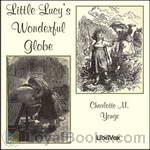 Little Lucy's Wonderful Globe
Little Lucy's Wonderful Globe
Travel with Little Lucy around the globe and learn a little geography and small bits about other cultures. | |
By: Gilbert White (1720-1793) | |
|---|---|
 The Natural History of Selborne
The Natural History of Selborne
The Reverend Gilbert White was the curate of the village of Selborne, a village in Hampshire, from 1784 to his death in 1793, living most of his life in the village. The book is in the form of a collection of letters to two friends, discussing the natural history of the areas that he knew, and natural history in general. White’s intense curiosity and his love for the world about him flow through his simple, straightforward style, and a gentle sense of humour colours many of his anecdotes. | |
By: Tobias Smollett | |
|---|---|
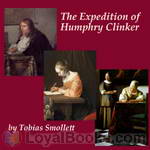 The Expedition of Humphry Clinker
The Expedition of Humphry Clinker
The Expedition of Humphry Clinker was the last of the picaresque novels of Tobias Smollett, and is considered by many to be his best and funniest work. Published in London on 17 June 1771, it is an epistolary novel, presented in the form of letters written by six different characters: Matthew Bramble, a Welsh Squire; his sister Tabitha; their niece and nephew, Jery and Lydia Melford; Tabitha’s maid Winifred Jenkins; and Lydia’s suitor, Wilson. Much of the comedy arises from differences in the descriptions of the same events by different participants... | |
By: Edward Bellamy (1850-1898) | |
|---|---|
 Looking Backward: 2000-1887
Looking Backward: 2000-1887
Looking Backward: 2000-1887 is a utopian novel by Edward Bellamy, first published in 1888. It was the third largest bestseller of its time, after Uncle Tom’s Cabin and Ben-Hur: A Tale of the Christ.The book tells the story of Julian West, a young American who, towards the end of the 19th century, falls into a deep, hypnosis-induced sleep and wakes up more than a century later. He finds himself in the same location (Boston, Massachusetts) but in a totally changed world: It is the year 2000 and, while he was sleeping, the U... | |
By: James Baikie | |
|---|---|
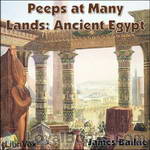 Peeps at Many Lands: Ancient Egypt
Peeps at Many Lands: Ancient Egypt
Written primarily for children, James Baikie’s ‘peep’ at ancient Egypt is a really well done, historical account of the ways of that fascinating land so many years ago. It has stood well the test of time, being both well researched and well written. It’s a fun book for everyone, and families especially will enjoy listening together. | |
By: Xenophon | |
|---|---|
 Xenophon's Anabasis
Xenophon's Anabasis
Xenophon the Athenian was born 431 B.C. He was a pupil of Socrates. He marched with the Spartans, and was exiled from Athens. Sparta gave him land and property in Scillus, where he lived for many years before having to move once more, to settle in Corinth. He died in 354 B.C. “Anabasis” is a Greek work which meane “journey from the coast to the center of a country.” This is Xenophon’s account of his march to Persia with a troop of Greek mercenaries to aid Cyrus, who enlisted Greek help to try and take the throne from his brother Artaxerxes, and the ensuing return of the Greeks, in which Xenophon played a leading role... | |
By: Lafcadio Hearn (1850-1904) | |
|---|---|
 Kokoro: Hints and Echoes of Japanese Inner Life
Kokoro: Hints and Echoes of Japanese Inner Life
In an introductory paragraph, Lafcadio Hearn declares his intention: "The papers composing this volume treat of the inner rather than of the outer life of Japan, for which reason they have been grouped under the title Kokoro (heart). Written with the above character, this word signifies also mind, in the emotional sense; spirit; courage; resolve; sentiment; affection; and inner meaning, just as we say in English, "the heart of things."" The result is a highly eclectic collection of stories, diary... | |
By: Jerome K. Jerome (1859-1927) | |
|---|---|
 Diary of a Pilgrimage
Diary of a Pilgrimage
A possibly fictionalised account by the comic novelist Jerome K. Jerome of a trip to Germany that he undertook with a friend in order to see the famous Passion Play at Oberammergau. The journey takes in London, Dover, Ostend, Cologne, Munich, Oberau, Oberammergau and then back to London via Heidelberg. As one might expect from the author of 'Three Men in a Boat', much goes wrong along the way, including seasickness, strange food, stranger beds, misleading guidebooks, bewildering train timetables, and numerous cultural and linguistic misunderstandings. | |
By: Isabella L. Bird | |
|---|---|
 The Englishwoman in America
The Englishwoman in America
Isabella Bird travels abroad in Canada and the United States in the 1850s. As an Englishwoman and a lone female, she travels as far as Chicago, Prince Edward Island, and Cincinatti. Her observations on the trials and tribulations of the journeys are astute, if formed by her place and time in history. Adventures with pickpockets, omnibuses, cholera, and rat invested hotels deter her not. (Sibella Denton) | |
By: Anna Harriette Leonowens | |
|---|---|
 The English Governess at the Siamese Court
The English Governess at the Siamese Court
1862 Anna Leonowens accepted an offer made by the Siamese consul in Singapore, Tan Kim Ching, to teach the wives and children of Mongkut, king of Siam. The king wished to give his 39 wives and concubines and 82 children a modern Western education on scientific secular lines, which earlier missionaries’ wives had not provided. Leonowens sent her daughter Avis to school in England, and took her son Louis with her to Bangkok. She succeeded Dan Beach Bradley, an American missionary, as teacher to the Siamese court... | |
By: Thornton Chase | |
|---|---|
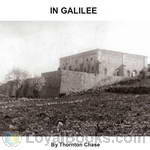 In Galilee
In Galilee
Thornton Chase (1847 – 1912) is commonly recognized as the first convert to the Bahá’í Faith of Occidental background. During his life he organized many Bahá’í activities in Chicago and Los Angeles and was considered a prominent Bahá’í. In 1907 Chase was able to go on pilgrimage. Though Chase was able to be with `Abdu’l Bahá in Akka for only three days, the experience transformed him. `Abdu’l Bahá, highly impressed by Chase’s qualities, conferred on him the title Thábit, “steadfast... | |
By: Robert Michael Ballantyne (1825-1894) | |
|---|---|
 Gorilla Hunters
Gorilla Hunters
Ralph Rover is happily at home from his adventure on The Coral Island and wondering if he should settle down when he receives a visit from an eccentric stranger that won't give his name. This visit starts him on a string of adventures that find him getting charged by rhinoceroses, chased by African natives, and facing down a larger-than-life gorilla on his own. Of course, this is only the start of his adventure in to the land of the gorillas. Please note: this book has some words now considered derogatory, which are used in a generic way without any derogatory meaning... | |
 Iron Horse
Iron Horse
“Is that your bundle, sir?” repeated Mr Blunt a little louder. “Eh? yes, yes—all right,” replied Edwin, annoyed at the interruption, and thinking only of Emma Lee, to whom he turned, and went on—“Well, when Colonel Jones had scaled the first wall—” “Come, sir,” said Blunt, entering the carriage, and laying his hand on Edwin’s shoulder, “it’s not all right. This is another man’s property.” The youth turned round indignantly, and, with a flushed countenance, said, “What do you mean?” “I mean that you are travelling with another man’s property,” said Blunt, quietly pointing to the strapped rug... | |
 Charlie to the Rescue
Charlie to the Rescue
Charlie Brooke is always rescuing others, and sometimes even himself! His latest rescue, though, could turn out to be fatal... | |
 Island Queen
Island Queen
The story of Dominic, Otto and Pauline Rigonda, three siblings who are blown onto an island after being shipwrecked, and are later joined by the immigrant passengers and crew of a ship that is wrecked on the same island. When the question of government comes up, the little colony chooses a queen, and they work on improving the island for some time, despite internal dissensions, and an attack by savages. But eventually the colony encounters natural forces it cannot resist, and the queen and her family return to England, hopefully to live "happily ever after". | |
By: Frances M. A. Roe | |
|---|---|
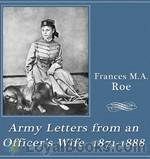 Army Letters from an Officer's Wife, 1871-1888
Army Letters from an Officer's Wife, 1871-1888
"There appeared from the bushes in front of me, and right in the path, two immense gray wolves . . . Rollo saw them and stopped instantly, giving deep sighs, preparing to snort, I knew . . . To give myself courage, I talked to the horse, slowly turning him around . . . when out of the bushes in front of us, there came a third wolf! The situation was not pleasant and without stopping to think, I said ‘Rollo, we must run him down - now do your best’ and taking a firm hold of the bridle, and bracing myself in the saddle, I struck the horse with my whip and gave an awful scream... | |
By: Henry W. Lucy (1845-1924) | |
|---|---|
 Faces and Places
Faces and Places
Faces and Places is a collection of articles on nineteenth century travel, events and personalities by the British journalist Henry Lucy, who wrote for the Daily News, a London newspaper. His open letter To Those About to Become Journalists rings as true today as when it was written.The first article, “Fred” Burnaby, includes a lively account of a balloon trip, while Night and Day on the Cars in Canada and Easter on Les Avants relate Lucy’s experiences of rail travel at that time. Other travel tales (A Night on a Mountain, Mosquitoes and Monaco, and Oysters and Arcachon) provide an insight into the Victorian Englishman’s attitude to Europe... | |
 East by West: a Journey in the Recess
East by West: a Journey in the Recess
East by West: a Journey in the Recess is an account of British journalist Henry Lucy's travels across America and on to the Far East during the parliamentary recess in 1883. Lucy was one of the most influential journalists of his day and, as "Toby M.P.", a noted humorist in Punch magazine. His acute powers of observation and light touch make this a most engaging book. It is a fascinating insight into the Englishman's travels abroad within two decades of the American Civil War and the end of Japanese isolationism... | |
By: Ellen Clacy | |
|---|---|
 A Lady's Visit to the Gold Diggings of Australia in 1852-53,
A Lady's Visit to the Gold Diggings of Australia in 1852-53,
“If you have visions of a middle-aged parasol-bearing lady smiling sweetly from her carriage as she tours Bendigo think again. In 1852, 20 year old clergyman’s daughter Ellen and her brother boarded ship for Melbourne then set off to walk to Bendigo. Dressed in her blue serge skirt which doubled as nightwear, she camped under a tent made of blankets, had mutton, damper and tea most meals and on arrival lent her hand to gold washing. And seemed to enjoy it !And amongst other things she tells of colonial life , transportation, emigration and other gold-fields.But you will need to listen to hear more about bush-rangers and orphans as well as what she did with her parasol.” | |
By: Clifford Simak (1904-1988) | |
|---|---|
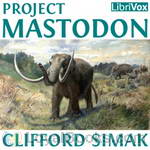 Project Mastodon
Project Mastodon
Clifford Simak deals with the implications of time travel in his own unique way in this story. What if a group of guys did it on their own, without any help from government or industry? On a shoestring,so to speak? Would anyone believe them? What would you do if you could go back 150,000 years to a time when mastodons and saber toothed tigers roamed North America? And what happens when they run out of money? All these questions are explored in the usual humorous, wry Simak way in this story. | |
By: Fritz Leiber (1910-1992) | |
|---|---|
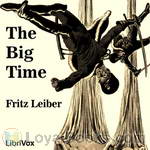 The Big Time
The Big Time
A classic locked room mystery, in a not-so-classic setting. (Intro by Karen Savage) | |
By: Dame Shirley (d.1906) | |
|---|---|
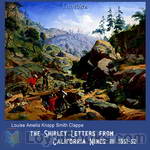 The Shirley Letters from California Mines in 1851-52
The Shirley Letters from California Mines in 1851-52
Louise Amelia Knapp Smith Clappe moved to California from Massachusetts during the Gold Rush of the mid-1800’s. During her travels, Louise was offered the opportunity to write for The Herald about her travel adventures. It was at this point that Louise chose the name “Shirley” as her pen name. Dame Shirley wrote a series of 23 letters to her sister Mary Jane (also known as Molly) in Massachusetts in 1851 and 1852. The “Shirley Letters”, as the collected whole later became known, gave true accounts of life in two gold mining camps on the Feather River in the 1850s... | |
By: Enos A. Mills (1870-1922) | |
|---|---|
 Wild Life on the Rockies
Wild Life on the Rockies
“This book contains the record of a few of the many happy days and novel experiences which I have had in the wilds. For more than twenty years it has been my good fortune to live most of the time with nature, on the mountains of the West. I have made scores of long exploring rambles over the mountains in every season of the year, a nature-lover charmed with the birds and the trees. On my later excursions I have gone alone and without firearms. During three succeeding winters, in which I was a Government Experiment Officer and called the “State Snow Observer,” I scaled many of the higher peaks of the Rockies and made many studies on the upper slopes of these mountains.” | |
By: George Hamilton | |
|---|---|
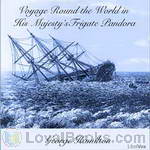 Voyage Round the World in His Majesty's Frigate Pandora
Voyage Round the World in His Majesty's Frigate Pandora
George Hamilton was the surgeon assigned to the frigate Pandora. The British Admiralty ordered the ship to the Pacific to arrest the Bounty mutineers and bring them back to England for trial. The commander, Captain Edward Edwards, also was ordered to chart the passage between Australia and New Guinea. While Edwards managed to arrest the mutineers still on Tahiti, he sank the Pandora on a reef near Australia. Hamilton tells this story and also the story of the crew’s fate after the Pandora sank. | |
By: Susan Warner (1819-1885) | |
|---|---|
 Nobody
Nobody
There are many romantic tales about a handsome and rich man falling in love with a beautiful lower class woman over the objections of his family. Remember Elizabeth Bennett and Fitzwilliam Darcy? however, it takes more than a good woman to secure a man's happiness. He has to have mental strength. It is not certain that our hero, Tom, has that. Lois is a great woman. However, according to his sister, she is a "nobody." Does money and position control everything? Certainly not. Good people deserve to be happy... | |
By: Meriwether Lewis (1774-1809) | |
|---|---|
 The Journal of Lewis and Clarke (1840)
The Journal of Lewis and Clarke (1840)
"The expedition of Messrs. Lewis and Clarke, for exploring the river Missouri, and the best communication from that to the Pacific Ocean, has had all the success which could be expected. They have traced the Missouri nearly to its source; descended the Columbia to the Pacific Ocean, ascertained with accuracy the Geography, of that interesting communication across the continent; learned the character of the country, its commerce and inhabitants; and it is but justice to say that Messrs. Lewis and Clarke, and their brave companions, have, by this arduous service, deserved well of their country... | |
By: John Henry Patterson (1867-1947) | |
|---|---|
 The Man-Eaters of Tsavo and Other East African Adventures
The Man-Eaters of Tsavo and Other East African Adventures
In 1898, during the construction of river-crossing bridge for the Uganda Railway at the Tsavo River, as many as 135 railway workers were attacked at night, dragged into the wilderness, and devoured by two male lions. The Man-Eaters of Tsavo is the autobiographical account of Royal Engineer Lt. Col. J.H. Patterson's African adventures. Among them, his hunt for the two man-eaters.This book was the basis for the 1996 film The Ghost and the Darkness. | |
By: Ezra Meeker (1830-1928) | |
|---|---|
 Ox-Team Days on the Oregon Trail
Ox-Team Days on the Oregon Trail
Ezra Meeker…was an early pioneer who traveled the Oregon Trail by ox cart as a young man. Beginning in his 70s, he worked tirelessly to memorialize the trail, repeatedly retracing the trip of his youth. This book is a memoir of those days. | |
By: Robert Falcon Scott (1868-1912) | |
|---|---|
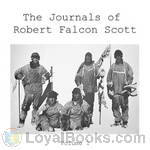 The Journals of Robert Falcon Scott
The Journals of Robert Falcon Scott
Capt. Robert F. Scott's bid to be the leader of the first expedition to reach the South Pole is one of the most famous journeys of all time. What started as a scientific expedition turned out to be an unwilling race against a team lead by R. Admunsen to reach the Pole. The Norwegian flag already stood at the end of the trail when Scott's party reached their target. All the five men of the Scott expedition who took part in the last march to the Pole perished on their way back to safety. Robert F. Scott kept a journal throughout the journey, all the way to the tragic end, documenting all aspects of the expedition... | |
By: Thomas Frost (1821-1908) | |
|---|---|
 In Kent with Charles Dickens
In Kent with Charles Dickens
By his own admission, Thomas Frost found it hard to make a living from his writing, and no doubt he used the name of Dickens in the title of this book to boost sales. Frost tells a good tale, and the book is not only of interest to enthusiasts of Dickens and the county of Kent.He includes some of Dickens’ own descriptions of locations, as well as regaling us with anecdotes about towns and villages which he visits, including an account of the last armed rising on British soil – the Battle of Bossenden Wood... | |
By: Alexander Kinglake | |
|---|---|
 Eothen, or Impressions of Travel brought Home from the East
Eothen, or Impressions of Travel brought Home from the East
A classic of Victorian travel writing, Kinglake’s book describes his journey through the Ottoman empire to Cairo, and his residence there in time of plague. | |
By: Kate Douglas Wiggin (1856-1923) | |
|---|---|
 A Cathedral Courtship
A Cathedral Courtship
A romantic comedy. A pretty young American girl tours English Cathedrals, with her very blue-blooded Aunt. Then boy meets girl. Boy chases girl. Boy loses girl. Boy finds girl. Finally, girl catches boy with the help of a mad bull. | |
By: Lavinia Honeyman Porter | |
|---|---|
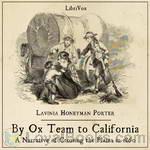 By Ox Team to California - A Narrative of Crossing the Plains in 1860
By Ox Team to California - A Narrative of Crossing the Plains in 1860
Imagine a young, twenty-something woman in 1860, reared “in the indolent life of the ordinary Southern girl” (which means she has never learned to cook); married to a professional man who knows “nothing of manual labor;” who is mother to a young son; and who has just found out she is pregnant with their second child. Imagine that this couple has become “embarrassed financially” by “imprudent speculations,” and that they are discussing what to do. They decide to buy a wagon and three yoke of unbroke oxen and head overland to California... | |
By: Henry Vizetelly | |
|---|---|
 California
California
Vizetelly, writing under the pseudonym J. Tyrwhitt Brooks, recalls an expedition to California he took between 1847-1848 . Originally, he planned to enlist as a surgeon for the US Army during the Mexican war, but conflicts had ended by the time he applied. In a quick change of plans, he joined a group of prospectors on their way to the newly found gold fields of California. While he might not find service in the military, his training as a physician made him a valuable addition to the ragtag team of explorers... | |
By: Watkin Tench (1758-1833) | |
|---|---|
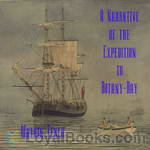 A Narrative of the Expedition to Botany-Bay
A Narrative of the Expedition to Botany-Bay
Watkin Tench was an officer of the British Marines in the First Fleet to settle NSW. This is an interesting and entertaining account of his experiences during that time (Introduction by Tabithat) | |
By: Richard Francis Burton (1821-1890) | |
|---|---|
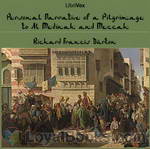 Personal Narrative of a Pilgrimage to Al-madinah and Meccah
Personal Narrative of a Pilgrimage to Al-madinah and Meccah
Sir Richard Francis Burton (1821 – 1890) was an English explorer, translator, writer, soldier, orientalist, ethnologist, linguist, poet, hypnotist, fencer and diplomat. He was known for his travels and explorations within Asia and Africa as well as his extraordinary knowledge of languages and cultures. According to one count, he spoke 29 European, Asian, and African languages.Burton's best-known achievements include traveling in disguise to Mecca, The Book of One Thousand Nights and A Night, an... | |
By: Alvar Núñez Cabeza de Vaca (ca. 1490/1507 - ca.1557/1579) | |
|---|---|
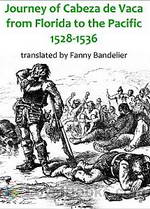 The Journey of Alvar Núñez Cabeza de Vaca
The Journey of Alvar Núñez Cabeza de Vaca
Few stories of shipwreck and survival can equal that of the 16th century Spaniard Alvar Núñez Cabeza de Vaca who, cast ashore near present day (USA) Tampa Bay, Florida, in 1528, survived eight years of hand-to-mouth existence among the Indians of the South and Southwest, and who walked on foot across the plains to the Pacific Coast, arriving in Mexico in 1536. In 1542 he published an account of his adventures, and the present reading is based on Fanny Bandelier’s English translation of that text... | |
By: May Kellogg Sullivan | |
|---|---|
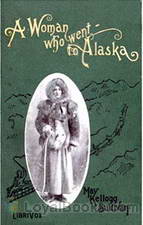 A Woman Who Went to Alaska
A Woman Who Went to Alaska
Alaska has only been a state since 1959, and the breathtaking terrain remains mostly unspoiled and natural. In modern times, many of us have had the pleasure of visiting Alaska via a luxurious cruise ship, where we enjoyed gourmet meals, amazing entertainment, and a climate-controlled environment. It's easy to also book a land package that enables you to see more of the country by train.Imagine what it was like to visit the same wild, untamed countryside in 1899. Instead of boarding a sleek, stylish cruise ship, you travel for weeks on a steamer... | |
By: Edward Granville Browne | |
|---|---|
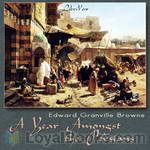 A year amongst the Persians; impressions as to the life, character, and thought
A year amongst the Persians; impressions as to the life, character, and thought
Edward Granville Browne (1862 – 1926), born in Stouts Hill, Uley, Gloucestershire, England, was a British orientalist who published numerous articles and books of academic value, mainly in the areas of history and literature. His works are respected for their scholarship, uniqueness, and style. He published in areas which few other Western scholars had explored to any sufficient degree. He used a language and style that showed high respect for everybody, even toward those he personally did not view in positive light... | |
By: Thomas Dowler Murphy (1866-1928) | |
|---|---|
 British Highways And Byways From A Motor Car
British Highways And Byways From A Motor Car
In this chronicle of a summer's motoring in Britain I have not attempted a guide-book in any sense, yet the maps, together with the comments on highways, towns, and country, should be of some value even in that capacity. I hope, however, that the book, with its many illustrations and its record of visits to out-of-the way places, may be acceptable to those who may desire to tour Britain by rail or cycle as well as by motor car. Nor may it be entirely uninteresting to those who may not expect to visit the country in person but desire to learn more of it and its people. (Introduction by Thomas Dowler Murphy) | |
By: Apsley Cherry-Garrard (1886-1959) | |
|---|---|
 Worst Journey in the World, Vol 1
Worst Journey in the World, Vol 1
The Worst Journey in the World is a memoir of the 1910–1913 British Antarctic Expedition led by Robert Falcon Scott. It was written and published in 1922 by a survivor of the expedition, Apsley Cherry-Garrard, and has earned wide praise for its frank treatment of the difficulties of the expedition, the causes of its disastrous outcome, and the meaning (if any) of human suffering under extreme conditions. | |
By: Mary Hunter Austin (1868-1934) | |
|---|---|
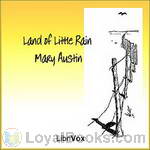 The Land of Little Rain
The Land of Little Rain
The Land of Little Rain is a book of sketches which portray the high desert country of southern California, where the Sierras descend into the Mojave Desert. Mary Austin finds beauty in the harsh landscape: "This is the sense of the desert hills--that there is room enough and time enough. . . The treeless spaces uncramp the soul." Her story begins with the water trails that lead toward the few life giving springs--the way marked for men by ancient Indian pictographs. Life and death play out at these springs... | |
By: Edward Whymper (1840-1911) | |
|---|---|
 Scrambles Amongst the Alps in the Years 1860-69
Scrambles Amongst the Alps in the Years 1860-69
Scrambles Amongst the Alps is one the great classics (some would say the greatest) of early mountaineering literature, and Edward Whymper (1840-1911) one of the leading figures of the early years of Alpine climbing. He is best known, of course, for his many attempts on the Matterhorn, and for the loss of four members of his climbing party after the successful first ascent of the peak in July, 1865. Although the Matterhorn stands in ways in the center of his book, there are descriptions of many other ascents as well, in the Alps of France and Italy, as well as those of Switzerland... | |
By: Richard Henry Dana, Jr. (1815-1882) | |
|---|---|
 Two Years Before the Mast
Two Years Before the Mast
| |
By: George Dunderdale (1822-1903) | |
|---|---|
 The Book of the Bush
The Book of the Bush
While the world was young, nations could be founded peaceably. There was plenty of unoccupied country, and when two neighbouring patriarchs found their flocks were becoming too numerous for the pasture, one said to the other: "Let there be no quarrel, I pray, between thee and me; the whole earth is between us, and the land is watered as the garden of Paradise. If thou wilt go to the east, I will go to the west; or if thou wilt go to the west, I will go to the east." So they parted in peace.(excerpt from book) | |
By: Isabella L. Bird (1831-1904) | |
|---|---|
 Unbeaten Tracks in Japan
Unbeaten Tracks in Japan
Isabella Lucy Bird was a 19th century English traveller, writer, and natural historian. She was a sickly child, however, while she was travelling she was almost always healthy. Her first trip, in 1854, took her to America, visiting relatives. Her first book, The Englishwoman in America was published anonymously two years later. Unbeaten Tracks in Japan is compiled of the letters she sent to her sister during her 7 months sojourn in Japan in 1878. Her travels there took her from Edo (now called Tokyo) through the interior - where she was often the first foreigner the locals had met - to Niigata, and from there to Aomori... | |
 Among the Tibetans
Among the Tibetans
Isabella L. Bird was an English traveller, writer and natural historian. She was travelling in the Far East alone at a time when such endeavours were risky and dangerous even for men and large, better equipped parties. In "Among the Tibetans", Bird describes her tour through Tibet with her usual keen eye: From descriptions of the landscape and flora to the manners, customs and religion of the local people we get a fascinating account of a world long past. | |